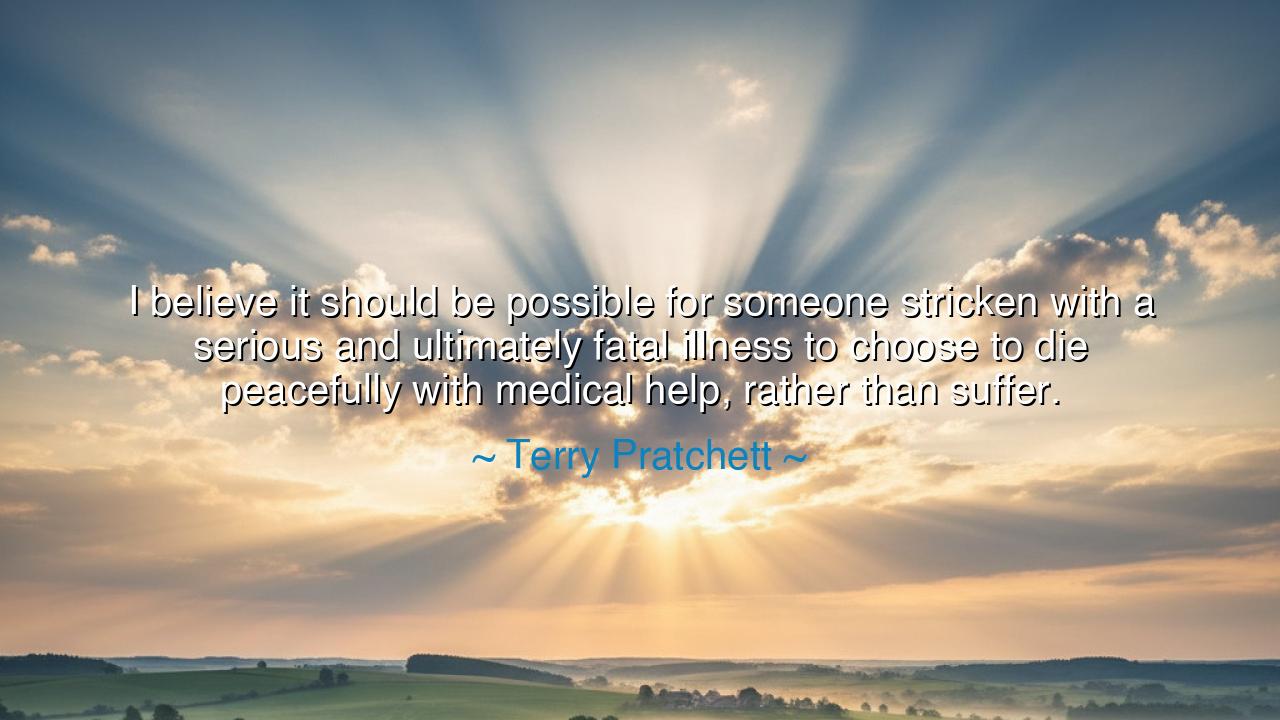
I believe it should be possible for someone stricken with a
I believe it should be possible for someone stricken with a serious and ultimately fatal illness to choose to die peacefully with medical help, rather than suffer.






Hear the solemn and courageous words of Terry Pratchett, the great storyteller, who declared: “I believe it should be possible for someone stricken with a serious and ultimately fatal illness to choose to die peacefully with medical help, rather than suffer.” In this utterance, there is no bitterness, only the clarity of a man who gazed upon his own mortality and sought to turn pain into wisdom. His words speak not only for himself, but for countless souls who have endured the long shadow of disease, yearning not for endless days of agony but for the dignity of a peaceful death.
The meaning of this quote lies in the heart of compassion. Pratchett calls for the right of choice, the power of a person to shape the last act of their own life. He does not speak of death as defeat, but as a passage, one that need not be clouded with needless suffering. To die peacefully, with medical help, is not to abandon life but to honor it, to leave with dignity rather than in torment. His words challenge us to see death not as the enemy to be resisted at any cost, but as a natural part of existence that, when embraced with care, can be faced with courage.
The origin of these words is deeply personal. Pratchett himself suffered from a rare form of Alzheimer’s disease, a slow and unyielding illness that robs the mind of memory and the body of independence. As a man of intellect, wit, and imagination, he knew what it meant to have his identity eroded by a relentless foe. From this place of lived truth, he spoke with conviction: that no human being should be forced to endure unbearable decline when the possibility of mercy in death could be granted.
History gives us examples that illuminate this teaching. Consider the ancient Stoic philosophers, who believed that the measure of a life was not in its length but in its virtue. For them, the choice to end one’s suffering was not weakness, but an assertion of dignity. Seneca, faced with an unjust sentence, met death with calm, believing it better to embrace a noble end than to endure humiliation and torment. Though the contexts differ, the principle remains: the human spirit has long sought dignity in the face of unavoidable death.
The emotional force of Pratchett’s words is amplified by his compassion for others. He does not speak only of his own fate but of all who are stricken with serious and fatal illness. His words cry out on behalf of those bedridden in hospitals, those who suffer silently in homes, those whose families watch helplessly as pain consumes their loved ones. He asks: must they endure this suffering when a gentler path is possible? His vision is not of despair, but of mercy—a mercy that allows life to end in peace, surrounded by respect, rather than in torment.
The lesson is profound: we must learn to honor both life and death. To honor life means to protect it, to nurture it, to fight for it when it can be saved. But to honor death means to accept it when it cannot be denied, and to grant it dignity when it comes. We must not be so afraid of death that we force others to suffer, nor so callous that we treat life as cheap. Instead, we must walk the narrow path of compassion, where choice, dignity, and care guide our steps.
Therefore, let your actions be shaped by this wisdom. Speak openly of mortality, for silence breeds fear. Support those who suffer, not only with medicine, but with love, patience, and respect. Consider that in some cases, the greatest gift is not to prolong, but to release. And above all, honor the choices of those who face their end, for it is their life and their death. In respecting their decision, we show the highest form of compassion.
And so, remember the teaching of Terry Pratchett: to die peacefully with dignity is as sacred as to live fully with joy. Do not fear this truth, but carry it as a light in dark places. For one day, each of us must walk this path, and the respect we give to others in their final hour will be the respect we hope for when our own hour arrives.






AAdministratorAdministrator
Welcome, honored guests. Please leave a comment, we will respond soon